- Homepage
- Broad beans
- Fava Bean Plants Need Plenty of Water
Fava bean plants need plenty of water
Fava bean plants need plenty of water in the dry season; if irrigation is not available don't bother growing them.
Favas grow best in the cooler weather; in fact we plant them in autumn for the winter in South Africa along with peas. But that is our dry season so irrigation is imperative for tender, juicy beans. Some varieties do not thrive in hot, humid conditions.
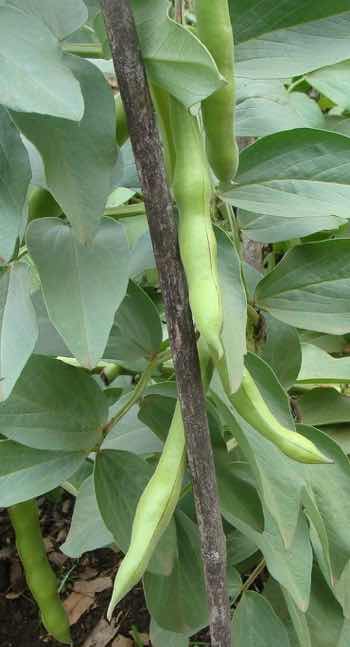
Fava bean plants need plenty of water
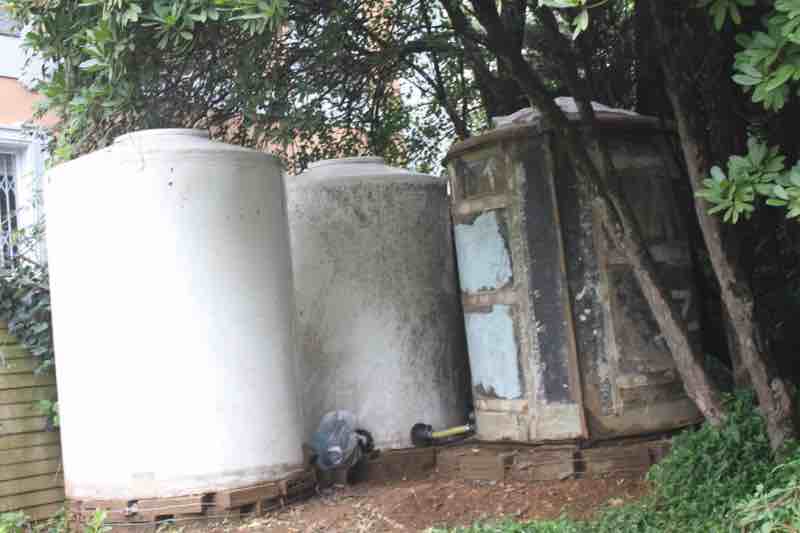
Fava beans are not grown much in commercial agriculture, firstly because they require a cool and preferably dry climate; and secondly as the plants must be staked and tied, a tiresome business. Most people have never seen or tasted them.
Also they can be very unpleasant, coarse and starchy when old; and because fava bean plants need plenty of water right through the growing period. Without irrigation it's not worth the effort; yet they are our favourite legume.
If you have only two or three plants, grow them near your home so that buckets of shower water can be used for irrigation.
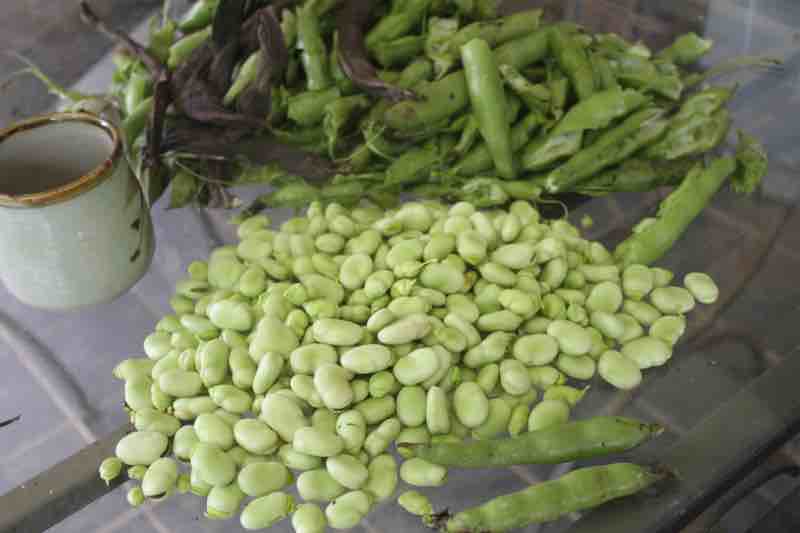 Vicia faba beans grow best in cooler weather.
Vicia faba beans grow best in cooler weather.Two varieties of fava beans
Vicia faba is best suited to milder climates like ours in the Midlands of South Africa; it's planted in late summer, grows through the winter and fruits in the spring.
Mucuna pruriens does best in hotter climates.
Vegetable protein
After harvesting regularly for several months, this huge supply of fava beans came from just two plants at the end of the season. After soy they are the richest source of vegetable protein for those who desire to eat less red meat.
They can produce a huge amount of valuable food for those suffering from malnutrition and stunting; just a cup of fava beans provides 40g of protein, more than enough for a growing child. Some reports claim they are the only legume that contains all the essential amino acids. Half a glass of milk or an egg is recommended to ensure a healthy meal.
Nearly a half of the small children in many villages in South Africa are permanently stunted, mentally or physically; or both. A few fava bean plants would change all of that.
Vitamins and minerals
They are also an enviable source of B vitamins and minerals such as calcium and potassium[2]; essential protection against fragile bones and high blood pressure.
A calcium deficiency causes a very common condition, osteopaenia,especially amongst women; low potassium is involved in raised blood glucose, muscle cramps and mental confusion too.
They contain a small amount of beta-carotene, the precursor of vitamin A that gives protection against blindness in children; far less though than peas and green beans. Enjoying a wide range of foods is always best.
Fibre in fava beans
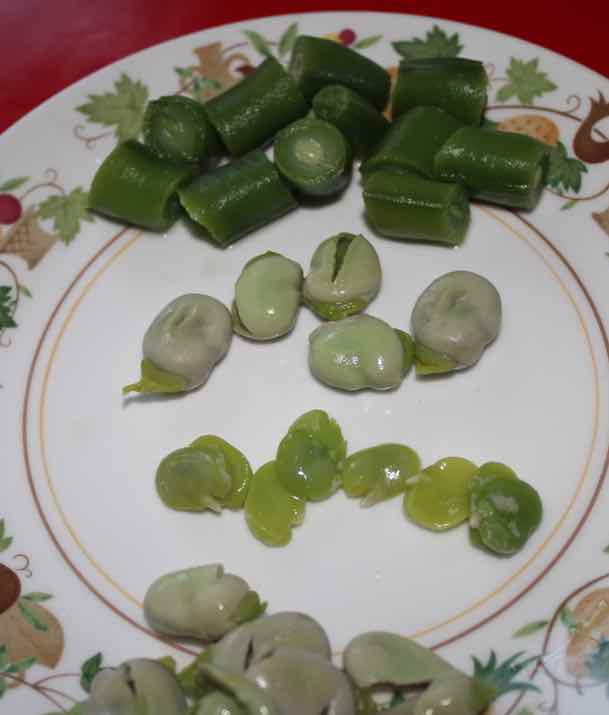 Skinning broad beans ruins broad beans
Skinning broad beans ruins broad beansThey are also a rich source of fibre, ideal for those suffering from constipation; provided one does not skin them, a common practice that is definitely not recommended. It raises the glycaemic index alarmingly. Generally like all legumes they are low GI; they contain large amounts of resistant starch.
L-dopa in fava beans
"They had harvested the first broad beans of the season that morning; the Parkinson's patient reported that they were exceptionally tender and juicy that year due to abundant rainfall."
- Neurología[1]
Vicia Faba and Mucuna pruriens are also known as the broad bean. The legume is the only common natural source of L-dopa, the precursor of a very important neurotransmitter.
"100 g of young green broad beans, a little over half a cup may contain as much as one hundred milligrams of L-dopa."
Therein lies both a blessing and a danger. They have been shown to improve motor function in those suffering from Parkinson's disease; but if also taking medication one can overdose producing severe agitation, profuse sweating and aggressive behaviour.
The pods easily dry out if the plants do not receive sufficient rainfall; they need to be watered deeply at least twice a week. If a ready supply of irrigation is not available they will not thrive.
"The recommended dose of L-Dopa is 300 to 1200 mg (higher if tolerated) per day, divided into 3 to 12 measures[6]."
Irrigation of broad beans
It is not sensible to grow fava bean plants if only expensive water is available for irrigation from the utility. Those wanting to enjoy the enormous benefits of these precious legumes must consider harvesting and storing the rain for the dry season.
Fava bean plants need plenty of water.
Plastic tanks are a possibility but we recommend an underground reservoir; it is both cheaper and the water remains very cold and is potable. That from the utility is often contaminated with plastic microparticles and a host of unwanted chemicals.
Chlorine residuals in utility water are of concern to researchers; they are associated with higher risks of cancer. Several European countries including the Netherlands and Germany no longer use this overload; it is all about unintended consequences.
What effect chlorine may have on the important rhizobia on the roots of fava beans remains unknown.
Inoculating rhizobia onto legumes can be applied either to the seeds or irrigated into the ground once the plants are established; avoid chlorinated water if possible.
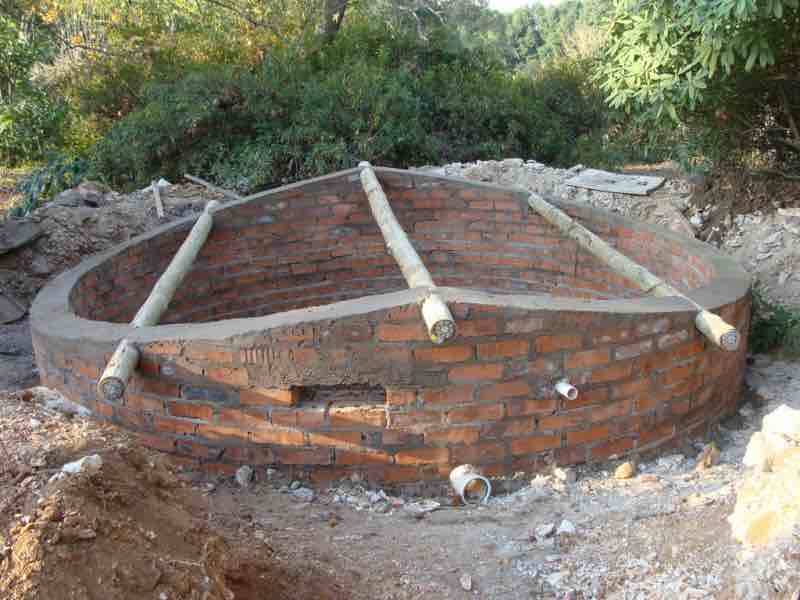
This brick reservoir for harvesting and storing the rain was built in just two weeks, including digging the hole by hand; it's not rocket science. It contains 27 kL of chlorine-free water for the irrigation of fava beans and the garden in general. Because it is so cold underground it is potable and suitable for home use too.
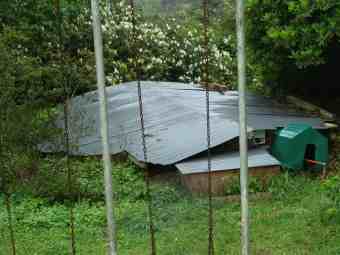
The size of the reservoir is obviously dependent on how much water is needed and the length of the dry season. If I was to do it again I would make it 2m deep, with a 2.5 metre radius; then those unsightly tanks would not be necessary.
Fava bean plants need plenty of water.
Parkinson's disease
"Broad beans, a natural source of L-dopa prolongs “on” periods in patients with Parkinson's disease."
- Journal of movement disorders[4]
Scientists have shown that broad beans produce sufficient L-dopa to be pharmacologically active[3]. And it prolongs the "on" period in those patients with Parkinson's disease who are suffering from fluctuating dystonias.
Painful cramps in the lower limbs
The so-called "off period" dystonias early in the morning usually involve the lower limbs with the possibility of painful plantar flexion of the feet but dorsal movement of the great toe.
During the "peak dose" period the dystonias tend to affect the mouth, face and neck[4]. Broad beans provide a natural source of L-dopa that smooths out these chorean movements.
Enjoying fava beans daily will lessen these maladies.
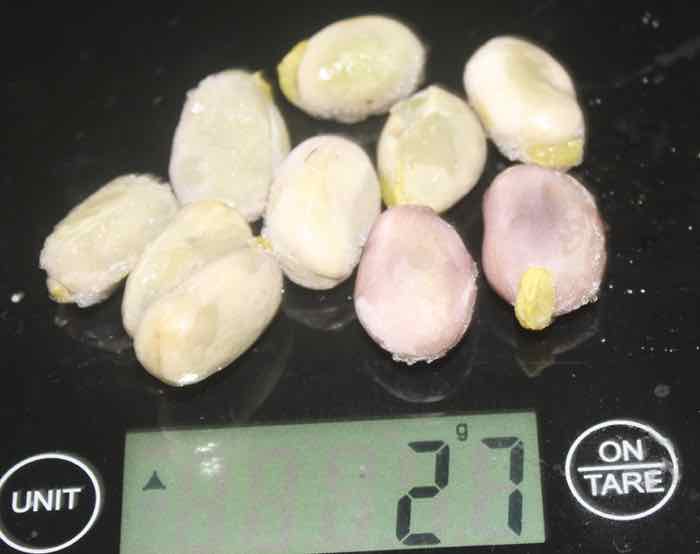 10 broad beans weigh about 27 grams.
10 broad beans weigh about 27 grams.Overdosing with fava beans
Cases have been described in the literature where patients on medication for Parkinson's disease ate large quantities of favas; it produced severe adverse symptoms[3]. It is to be noted that there is even more L-dopa in the young beans and their pods; and also when sprouted.
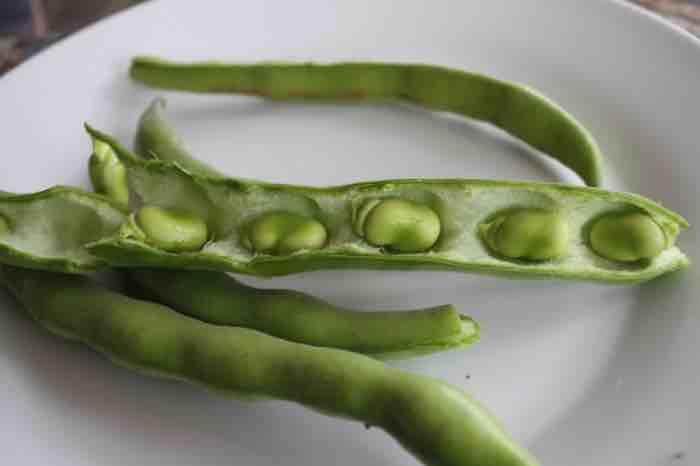 Young favas can be enjoyed in the pod as with the common green bean.
Young favas can be enjoyed in the pod as with the common green bean."There is even more L-dopa from the young beans in their pods."
100 g of young green broad beans, a little over half a cup may contain as much as one hundred milligrams of L-dopa; in their pods it would be far more. The scientific literature has many cases of significant improvement in motor symptoms.
For fava beans to be used as a regular medicine to control the symptoms of Parkinson's disease, we recommend freezing[5] them to put up a supply for the whole year.
Staggered planting of fava seeds will supply fresh L-dopa for four or five months; for the rest of the year you would be dependent on the frozen beans.
I would recommend starting with five mature beans, morning and evening; or one young green pod eaten whole. Make exact notes of the dose and how the patient reacts during the day.
Gradually increase the dose taking perhaps a teaspoon or more of broad bean hummus every hour once the most beneficial amount has been established.
Done precisely like this, overdosing is most unlikely even in those also taking medication.
"Start with five mature fava beans, morning and evening; or one young green pod eaten whole."
Remember you are using your favas as a drug; the timing and dosage are both very important. Some reports state that over half of those suffering from Parkinson's disease can go off all the medication for the condition; with improved control, supplying their needs for L-dopa entirely from the beans and their young pods. Obviously this has to be done mindfully; by a family member usually.
The preservatives in processed meat have been fingered as one of the possible causes of this oft horrific neurodegenerative condition; so have dry-cleaning solvents and chemicals known as THMs.
It affects nearly 2% of people over 65 and the prevalence is increasingly rapidly, even faster than Alzheimer's disease. It has to do with lifestyle and chemicals, many used to preserve and flavour our food.
Broad bean hummus
Since mature favas tend to become quite fibrous and chewy we recommend turning the older seeds into a broad bean hummus, instead of using the more conventional chickpeas. Blending them thoroughly breaks down this slightly unpleasant feature; they are an excellent source of resistant starch for the friendly flora in the gut.
Fava beans can readily be added to soups and stews.
On one final note, because Parkinson's disease often affects the mental acuity of the patient, it is to be recommended that a family member grow the broad bean plants remembering they need plenty of water; or at least assist. They should also ensure the correct dose on a regular basis each day just as with medication.
One needs to apply the mind to this, remembering that the young seeds and their pods contain even more L-dopa early in the season; but the broad bean hummus would have less.
Favism: abdominal pain, dark urine and jaundice 2-3 days after consumption of broad beans.
Fava bean plants need plenty of water
Fava bean plants need plenty of water throughout the growth period.
To rediscover your soul the poet Yates recommends nine bean-rows and a hive for the honeybee. We all need to stop and be still periodically; and ponder the meaning of life.
- Broad bean (Vicia faba) consumption and Parkinson's disease: a natural source of L-dopa to consider
- Nutrition facts of favas, broad beans
- Broad bean (Vicia faba) consumption and Parkinson's disease: a natural source of L-dopa to consider
- Broad bean (Vicia faba). A natural source of L-dopa which prolongs “on” periods in patients with Parkinson's disease who have fluctuations
- Freezing broad beans
- Levodopa (L-Dopa)
When browsing use right click and "Open Link in New Tab" or you may get a bad gateway signal.
The material expressed on this page is gleaned from the nutritional and environmental literature; it is clearly referenced. A plain distinction is made between the author's opinion and that which is scientifically proven. When in doubt consult your health professional.
To suggest a correction or clarification, write to Dr Bernard Preston here. Contact.
Newsletter
Our newsletter is entitled "create a cyan zone" at your home, preserving both yourself and Mother Earth for future generations; and the family too, of course. We promise not to spam you with daily emails promoting various products. You may get an occasional nudge to buy one of my books.
Here are the back issues.
- Lifestyle and ideal body weight
- What are ultra-processed foods?
- Investing in long-term health
- Diseases from plastic exposure
- Intensive lifestyle management for obesity has limited value
- A world largely devoid of Parkinson's Disease
- The impact of friendly bacteria in the tum on the prevention of cancer
- There's a hole in the bucket
- Everyone is talking about weight loss drugs
- Pull the sweet tooth
- If you suffer from heartburn plant a susu
- Refined maize meal and stunting
- Should agriculture and industry get priority for water and electricity?
- Nature is calling
- Mill your own flour
- Bake your own sourdough bread
- Microplastics from our water
- Alternative types of water storage
- Wear your clothes out
- Comfort foods
- Create a bee-friendly environment
- Go to bed slightly hungry
- Keep bees
- Blue zone folk are religious
- Reduce plastic waste
- Family is important
- What can go in compost?
- Grow broad beans for longevity
- Harvest and store sunshine
- Blue zone exercise
- Harvest and store your rainwater
- Create a cyan zone at your home
Did you find this page interesting? How about forwarding it to a friendly book or food junkie? Better still, a social media tick would help.
- Homepage
- Broad beans
- Fava Bean Plants Need Plenty of Water
Address:
56 Groenekloof Rd,
Hilton, KZN
South Africa
Website:
https://www.bernard-preston.com